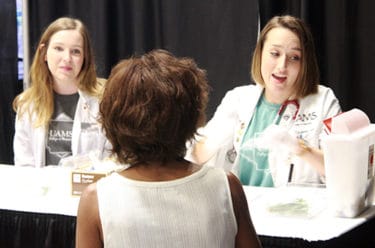To the sounds of bingo numbers being called out, speakers on a main stage and the general murmur of conversations, several hundred seniors circulated through the Statehouse Convention Center in downtown Little Rock to participate in the Senior Expo.
Sponsored by UAMS and presented by the Arkansas Democrat-Gazette, the event pulled visitors from throughout central Arkansas and beyond.

About 243 seniors received free health screenings for blood glucose, blood pressure and heart rate as well as medication and vaccination education.
The UAMS Donald W. Reynolds Institute on Aging provided geriatricians to give free consultations throughout the day at the “Ask the Doctor” booths. UAMS Harvey & Bernice Jones Eye Institute staff performed 60 vision screenings.
As part of a panel discussion and question-and-answer session, Jeanne Wei, M.D., Ph.D., executive director of the UAMS Donald W. Reynolds Institute on Aging, and Johnathan Goree, M.D., director of Interventional Pain Management Services at UAMS, gave a presentation on “New Treatments for Managing Pain.”
Both Goree and Wei agreed someone experiencing pain, particularly in the joints and limbs, should not stay still for too long.
“I work with a physical therapist who says ‘movement is lubrication for the joints,’” Goree said. “One of the best things you can do to keep out of our offices is to keep moving. Pain makes you want to keep from moving. Pain can cause inactivity and inactivity can cause pain”
Wei provided three tips for treating acute pain:
- Applying ice to an affected area is the best because it stops nerve traffic and reduces inflammation, making it easier to recover.
- Taking over-the-counter medications like acetaminophen or ibuprofen for the first 48 hours.
- Keeping an affected arm, leg or foot above the level of your heart, so fluids can drain and reduce swelling.

“All of us know there is an epidemic of opioids and other medications that don’t really work for ongoing pain,” Wei said. “We don’t want anybody to get hurt by continuing to take those medicines long term. Research has shown that you only need between three days to seven days of a prescription of opioid medication after a surgery or procedure or injury.”
For anyone, but especially for patients older than 60, use of opioids to treat chronic pain can lead to negative side effects like nausea, constipation, respiratory changes, falls, walking difficulty and bladder issues.
Beyond just a few days of opioid use, patients should try to use mindfulness, meditation and even hypnosis to cope with the mental and emotional stress of chronic pain.
Among the UAMS services and medical specialties represented at the Expo with booths were geriatrics, orthopaedics, caregiver training, ARresearch, stroke, vascular, cancer and nutrition services.
Other presentations made by UAMS physicians included: “Retinal Diseases— Seeing into Your Senior Years,” ophthalmologist Ahmed Sallam, M.D.; “Colon Cancer Screening: Why It’s More Important Than Ever,” colorectal surgeon W. Conan Mustain, M.D.; “Protecting Our Hands and Wrists,” orthopaedic surgeon Theresa Wyrick-Glover, M.D.
